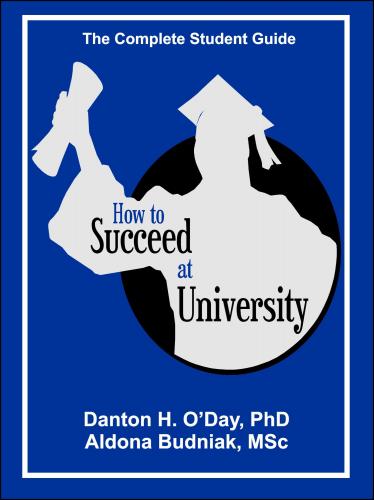How to Succeed At University--International Edition. Danton O'Day
provided by some university bookstores and private companies.
At this stage you may have many concerns such as which university to attend and what type of degree you wish to pursue. You should also think about how these decisions will impact you financially. If you’re considering studying in another country, be aware that tuition rates tend to be significantly higher for international students than those for domestic students. The availability and types of scholarships for which you will be eligible will also differ. Similarly, fees tend to be higher in private universities than in public institutions. On the other hand, in some countries students attending public universities are not charged tuition fees at all. Some of the costs that must be considered in addition to fees include books and living expenses. So if you anticipate that money will be an issue, attending a local, public university to keep your tuition and living expenses down, in addition to careful budgeting, may be the safest bet. But, again, don’t let your lack of finances prevent you from pursuing the type of education you need. Don’t compromise unless there are no other options.
Did You Know?
A study published in 2008 analyzed various aspects of the first-year university experience, including the reasons why students left their programme of study. The survey, conducted among students at over twenty different higher education institutions in the United Kingdom, found that 29% of students who had not re-enrolled for the second year of studies (i.e., dropped out) cited “financial problems” as a “very” or “moderately” influential factor.9
Chapter 1 Summary
1.You can succeed at university if you follow the rules set down in this book.
2.Develop independence; don’t follow the crowd.
3.Know your personal strengths and weaknesses; exploit your strengths and overcome your weaknesses.
4.Don’t limit yourself; keep your options open by selecting a first-year programme that is general and versatile.
5.Develop your powers of communication. If necessary, attend a writing workshop.
6.Think about your goals. Are they realistic? Are you pursuing an area that genuinely interests you?
7.Keep your options open so that you have alternative pathways to fall back on should your goals change.
8.Many possible career and education pathways are open to you during and after your postsecondary studies.
9.The first year is the hardest. Get on track right away and reap the benefits later.
10.Learn to deal effectively with your newfound freedom: know when to work and when to play.
11.Living in residence can maximize the time you have for study and enhance your social life, but there are dangers.
12.Grades are important for your future success. Grades are an offshoot of knowledge: the more you know, the better your grades can be.
13.You have a much better chance of finding a well-paying job if you get your degree than if you don’t. The higher your grades, the greater your chance of getting a job.
14.Your university training will give you skills that will help you succeed in any job whether it is related to your area of specialization or not.
15.You can augment your educational finances through scholarships, bursaries and student loans.
Chapter 1 Endnotes
1Samuel Caddick, “Back to Bologna. The long road to European higher education reform”, EMBO Reports 9.1 (2008): 18.
2Henry P. Chow, “Assessing the Determinants of Life Satisfaction in a Canadian University Student Sample”, Alberta Journal of Educational Research 51.1 (2005): 87–88.
3ACT, Inc., “The Condition of College & Career Readiness 2011: College Readiness Benchmarks by Subject”, ACT, 17 Aug. 2011, 29 Apr. 2012 <http://www.act.org/research/policymakers/cccr11/readiness1.html>.
4National Science Foundation, Division of Science Resources Statistics, “TABLE 35. Relation of occupation to field of degree among recent graduates with bachelor's degrees in science, engineering, and health, by major field of degree: April 2006”, Characteristics of Recent Science and Engineering Graduates: 2006, Aug. 2010, 18 May 2012 <http://www.nsf.gov/statistics/nsf10318/pdf/tab35.pdf>.
5Prairie Research Associates, Inc., “CUSC 2010 First-Year University Student Survey Master Report”, Canadian University Survey Consortium, June 2010, 29 Apr. 2012 <http://www.cusc-ccreu.ca/publications/2010_CUSC_firstYr_Master.pdf>.
6Céleste M. Brotheridge and Raymond T. Lee, “Correlates and Consequences of Degree Purchasing among Canadian University Students”, Canadian Journal of Higher Education 35.2 (2005): 71.
7Hua Shen and Adrian Ziderman, “Student loans repayment and recovery: international comparisons”, Higher Education 57.3 (2009): 315, 317.
8Jesse Rothstein and Cecilia Elena Rouse, “Constrained after college: Student loans and early-career occupational choices”, Journal of Public Economics 95.1–2 (2011): 149, 158.
9Mantz Yorke and Bernard Longden, “The first-year experience of higher education in the UK: Final Report”, The Higher Education Academy, 1 Jan. 2008, 18 May 2012 <http://www.heacademy.ac.uk/assets/documents/resources/publications/FYEFinalReport.pdf>.
Chapter 2
The Complexity of the University
Colleges and Universities
Right now we should consider just what a university is. What does it consist of? How does it function? What is it going to do for you?
In general, postsecondary institutions with a primary academic focus are called universities while those with a more practical focus are called colleges. Universities usually require higher academic standings in high school than colleges. Similarly, universities typically offer Bachelor’s, Master’s and often PhD degrees while colleges typically offer certificates and diplomas.
Did You Know?
In some countries, the term “college” refers to higher education in general and may be used interchangeably with “university”. Alternatively, within each university there may be constituent “colleges” but these are university colleges; they offer studies at the university level that culminate with the granting of a university degree. Within the university, each “college” is usually a self-governing educational unit and usually has programmes that make it unique. Note that sometimes “college” is also used to refer to secondary schools, but these are obviously not higher education institutions!
In
